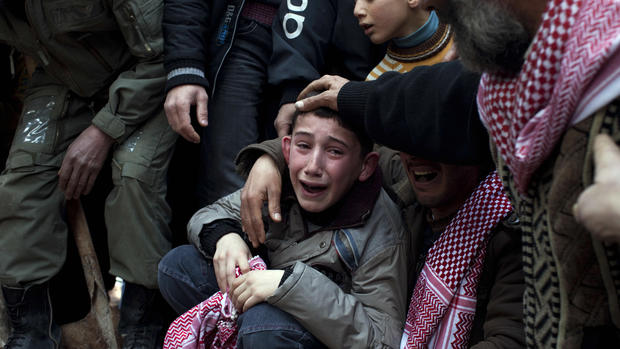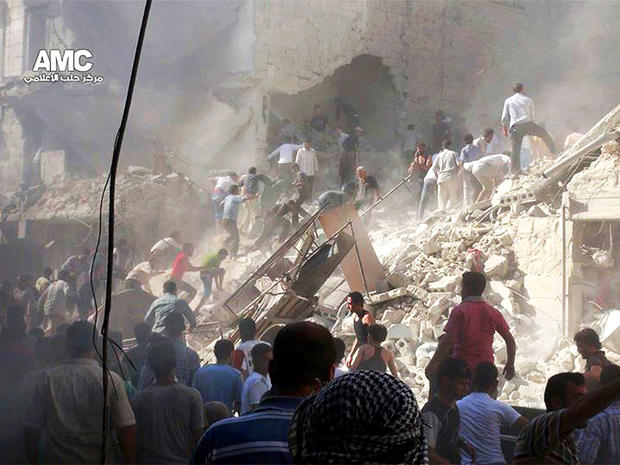Fearing a U.S. strike, Syria warns of global "chaos"
Updated 5:25 p.m. ET
DAMASCUS, Syria A senior Syrian official said Monday that his country will defend itself against any international attack and will not be an easy target as the U.S. and other countries ramp up rhetoric in response to an alleged chemical weapons attack last week on a rebel-held neighborhood of the Syrian capital.
In an interview with The Associated Press in Damascus, Syrian Deputy Foreign Minister Faisal Mikdad said airstrikes or other action against Syria would also trigger "chaos" and threaten worldwide peace and security.
He spoke Monday as support for an international response was mounting if it is confirmed that President Bashar Assad's troops were responsible for the Aug. 21 attack, which activists say killed hundreds.
The Obama administration is now talking behind the scenes as if there is almost no doubt about Assad's use of chemical weapons, CBS News senior White House correspondent Major Garrett reported on "CBS This Morning."
President Obama is moving toward a military strike against Syria. Any final decisions haven't been made, but senior administration officials talk of Syria now as a place where the U.S. and its allies must exact a military price for heavy use of chemical weapons. There is no longer serious debate within the administration if the Assad regime used chemical weapons last week.
Sen. Bob Corker, R-Tenn., also appearing on "CBS This Morning," confirmed Garrett's assessment, adding: "There's no question the administration is building support with our NATO allies."
There are currently high-level conversations between the Obama administration and the British, French and German governments -- part of an intense effort to build a broad coalition outside the United Nations.
Secretary of State John Kerry on Monday condemned the use of chemical weapons against civilians in Syria, calling it a "moral obscenity" that could soon bring a military response during a press conference at the State Department. Kerry appeared to be outlining a justification for possible U.S. military action.
"This is about the large scale, indiscriminate use of weapons that the civilized world long ago decided must never be used at all, a conviction shared even by countries that agree on little else," Kerry said at the State Department. "There is a clear reason that the world has banned entirely the use of chemical weapons."
The U.N. weapons inspector team currently in Syria is not going to assign blame for any potential chemical weapons attack -- instead just investigate whether one occurred -- making any chance the Security Council will back international action in the two-year-old civil war even less likely. Russia has long been a firm backer of the Assad regime, and on Sunday warned the U.S. to not turn Syria into another Iraq. Russian Foreign Minister Sergei Lavrov said Monday any intervention in Syria without a Security Council resolution would be a grave violation of international law, according to Reuters.
U.S. Defense Secretary Chuck Hagel said Monday the Obama administration is "considering all different options."
Speaking with reporters after meeting with his Indonesian counterpart, Hagel said, "If there is any action taken it will be in concert with the international community and within the framework of a legal justification."
French Foreign Minister Laurent Fabius also said that in the event the chemical attack was confirmed, "The only option that I can't imagine would be to do nothing."
The Syrian foreign minister, however, warned Syria was ready to respond.
"There will be no international military intervention," Mikdad said in the interview at his office. "If individual countries want to pursue aggressive and adventurous policies, the natural answer ... would be that Syria, which has been fighting against terrorism for almost three years, will also defend itself against any international attack."
"They will bear the responsibility for such an attack, which will result in killing thousands of innocent people, as happened in Libya, and committing criminal actions against a sovereign country," Mikdad added. "Syria will not be an easy target."
Mikdad did not elaborate on how Syria might defend itself, but he said such an attack would trigger "chaos in the entire world."
- On Syria intervention, lawmakers find strange bedfellows
- U.N. inspectors shot at in Syria on way to visit site of alleged chemical attack
- U.S. official claims "very little doubt" Syria used chemical weapons
The kind of international response that might occur is still being debated, but some senior U.S. lawmakers have called for actions similar to the ones NATO and other allies undertook in Libya in 2011: Enforcing a no-fly zone as well as the possibility of missile strikes.
Sen. Corker on "CBS This Morning" called for "surgical, proportional" strikes that "lets the regime know we're not gonna put up these kind of activities."
At a press briefing Monday, White House spokesman Jay Carney said President Obama has "made clear that he does not envision boots on the ground, and that remains the case."
Top U.S. administration officials do not described their efforts as an attempt to topple the Assad government, but to penalize the widespread use of chemical weapons and deter their future use and proliferation.
The Syrian deputy foreign minister said the U.N. should be given a chance to investigate before any judgment is made, "not strike and then start judging."
"The team is going to do its work. It is not the business of the United States to judge because the final judgment will be that of the team. The team knows what to do," he said.
Mikdad spoke shortly after the U.N. said unidentified snipers opened fire at one of the U.N. vehicles carrying a team investigating the alleged use of chemical weapons. The Syrian government accused the rebels of firing at the team, while activists and the main Syrian opposition group in exile said a pro-government militia was behind the attack.
The foreign minister also said the position of the French government is "shameful and full of lies and irresponsible" and said the same applies to the position of the U.K. and other European countries "which have become promoters of terrorism."
Mikdad said he is "100 percent confident" that neither the Syrian army nor anyone who is part of the Syrian government used chemical weapons, adding the Syrian regime "will never use them against its own people, if it has them."
"If such a thing has happened, then it is the armed groups," he said.

